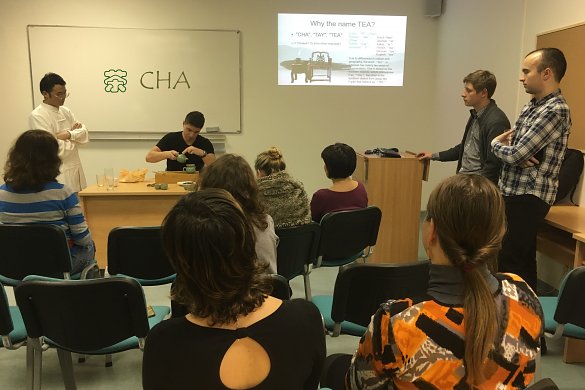Fragrance of Chinese Tea
2019-12-13

Chinese tea culture has a long history. The legends say that it was Shennong, the Chinese agricultural god, who had first discovered TEA. The first recorded drinking of tea with the earliest records of tea consumption could be dated back to the 10th century BC. Another early credible record of tea drinking dates to the 3rd century AD, in a medical text by HUATuo, a famous Chinese physician, who stated, "to drink bitter tea constantly makes one think better." In order to give MBU staff and students a brief sense of Chinese tea culture, CIB at MBU held a cultural experience activity “Fragrance of Chinese Tea” on the afternoon of Dec 13.
The activity begins with CIB Director WANG Jianwei’s introduction of the origin of tea and the spread of tea over the world. Wang says, tea had been a medicine, a food long before it became a popular beverage, and that tea pronounces similarly in different languages largely due to the Chinese dialects of tea while tea was introduced to the world. He then put forth the six categories of Chinese tea, namely, green tea, white tea, yellow tea, oolong tea, black tea and dark tea, and their different functions to human bodies. With real and physical tea in the trays, everyone present can tell visually and visibly the different formation and different smells of the tea. Wang also explained the different temperature to brew tea of different categories.
CIB Chinese teacher QIN Bofang introduces the utensils and tools to be used in a tea ceremony, and demonstrates the process of brewing tea. He then brewed green tea, black tea and dark tea for participants of this activity to smell the scents and to savor the tastes.
Then he invites a teacher and a student respectively to show what they had learned today to brew tea. Although it had been just for an hour for them to learn about tea and tea ceremony, they could brew different tea with ease and confidence. With little guidance, they could follow the steps of a tea ceremony in a proper, even perfect way. The student tried Jin-Jun-Mei (black tea) and the teacher tried Pu’er (dark tea), both of which are good to drink in this season of the year. They divided their tea in the cups with “courtesy and manner”. Joyfully, all participants of this activity sipped their tea and enjoyed the flavour and fragrance of tea.
“This is very helpful, and we like it”, “Eventually, I figure out why my tea tastes differently”, come the comments from the participants. They all hope there can be similar activities of this kind in the future for them to partake and experience.

